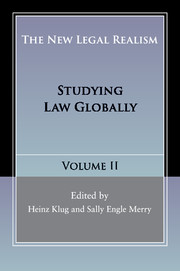Book contents
- Frontmatter
- Dedication
- Contents
- List of contributors
- Preface to The New Legal Realism, Volumes I and II
- 1 Introduction
- Section I The Globalization of Law
- Section II The Global Transfer of Norms
- Section III global institutions and the changing roles of judges and lawyers
- Section IV Global Justice
- Index
- References
1 - Introduction
Published online by Cambridge University Press: 05 May 2016
- Frontmatter
- Dedication
- Contents
- List of contributors
- Preface to The New Legal Realism, Volumes I and II
- 1 Introduction
- Section I The Globalization of Law
- Section II The Global Transfer of Norms
- Section III global institutions and the changing roles of judges and lawyers
- Section IV Global Justice
- Index
- References
Summary
Studying law globally is both necessary to understanding the arc of law and justice in the twenty-first century as well as a challenge to explore how law manifests itself across cultures, institutional arrangements, and economic contexts. While legal formalism still dominates the doctrinal study of law, the emergence of legal realism in the first quarter of the twentieth century opened up the study of law to a wider range of approaches, including those of social science. Today there is a healthy debate over the different approaches and meanings of legal realism, or what is now described as New Legal Realism (NLR). However, there is little doubt that our understanding of law in all its dimensions has been enhanced by the multidisciplinary contributions of social scientists and lawyers who have explored not only the logic of the law but also the multiple ways in which law manifests itself in society, whether local or global.
For a new legal realism, the understanding of law is rooted not only in an empirical knowledge of how law works in context but also in drawing attention to the relationship between the use of law and other ways of understanding and studying law, whether doctrinal or jurisprudential. Concerned with ensuring an open yet reflexive approach to the study of law, a new legal realism embraces a multidisciplinary approach yet remains concerned with ensuring a careful translation between law and empirical research. It is this concern that makes studying law globally such a challenge as well as an opportunity to understand the role law might play in achieving the goals of justice and stability sought by communities across the globe.
In order to think about what a new legal realist approach to studying law globally might help us to do, we must first reflect on what we understand new legal realism to be. Confronting this question, our colleague Alexandra Huneeus has suggested three possible ways of understanding what new legal realism might mean in the academy today, especially when we try to think of new legal realism as an approach to the study of law that is distinct from regular social science scholarship that focuses on understanding how law works in society.
- Type
- Chapter
- Information
- The New Legal RealismStudying Law Globally, pp. 1 - 10Publisher: Cambridge University PressPrint publication year: 2016
References
- 2
- Cited by

